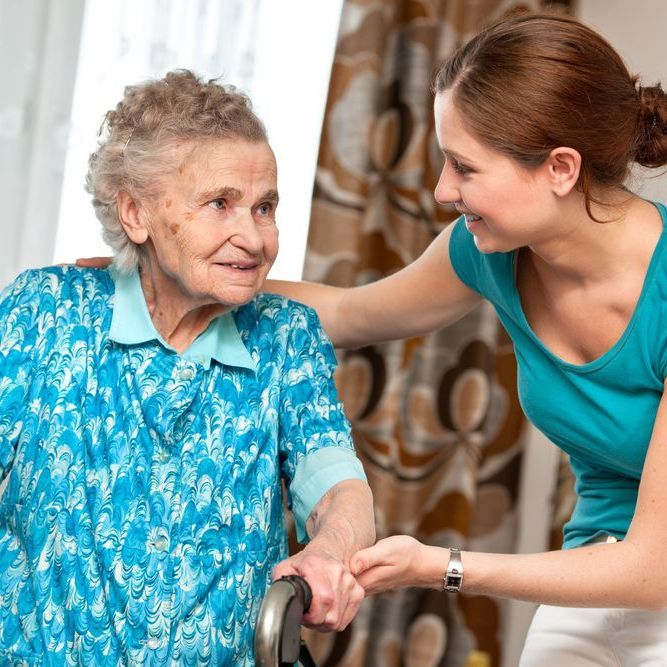AGING IN PLACE
Supporting Mental Wellness Alongside Physical Care
When providing in-home care for seniors, it’s crucial to remember that caregiving extends far beyond addressing physical needs. While assisting with daily tasks like mobility, hygiene, or meal preparation is essential, it’s equally important to focus on the emotional and psychological well-being of seniors. As individuals age, they often experience challenges such as social isolation, loss of autonomy, and health-related stress. These emotional burdens can take a significant toll on their mental health. By acknowledging and addressing these emotional needs, caregivers can significantly improve the overall quality of life for seniors, making their in-home care experience more fulfilling and empowering.
At Silver Spring Home Caregivers, LLC, we specialize in delivering holistic care that supports both the body and the spirit. We understand that emotional health is key to aging with dignity and joy, and our caregivers are trained to meet these needs compassionately and effectively. Below are the key ways caregivers can help meet the emotional needs of seniors receiving in-home care.
Supporting Mental Wellness Alongside Physical Care
When providing in-home care for seniors, addressing physical needs like mobility and hygiene is essential, but equally important is recognizing and nurturing their emotional and psychological well-being.
01
Promote Social Connections
Is one of the most significant emotional challenges that seniors face. As individuals age, it becomes more difficult to stay in touch with friends and family due to mobility limitations, geographic distance, or the loss of loved ones. This isolation can lead to loneliness and depression. In-home caregivers can help by encouraging seniors to maintain connections with others.
02
Foster a Sense of Independence
As seniors age, many face the emotional challenge of losing their autonomy. When relying on others for basic tasks, such as dressing, cooking, or transportation, seniors may feel helpless or frustrated. Empowering seniors to maintain a sense of independence is a crucial emotional need that caregivers must address.
03
Address Feelings of Loneliness & Loss
Seniors often experience deep emotions such as grief, sadness, or loneliness due to the loss of loved ones, declining health, or significant life changes. These feelings, if not addressed, can escalate into depression or anxiety.
04
Encourage Mental Stimulation
Mental engagement is crucial for maintaining emotional well-being. Seniors who remain mentally active are often more engaged and less likely to experience feelings of boredom or disconnection.
Reinforce a Sense of Purpose
A sense of purpose is essential for emotional health. Many seniors experience a loss of purpose due to retirement, physical limitations, or the changing nature of their lives. This can lead to feelings of sadness or even despair. Caregivers can help seniors rediscover their sense of purpose by encouraging them to engage in hobbies or interests they’ve enjoyed in the past. For example, seniors may want to return to activities like knitting, cooking, or even volunteering in a capacity that suits their abilities.
Caregivers can also help seniors set small, achievable goals — whether it’s learning a new skill, completing a project, or simply helping around the house. Simple tasks like organizing a drawer, watering plants, or mentoring younger family members can provide seniors with a sense of accomplishment and pride. Helping seniors feel that they still have a meaningful role in the world leads to better emotional health, giving them something to look forward to each day.
For more information about how to Understand Alzheimer’s Disease, visit:
Set Clear Expectations About Abilities & Limits
It helps to share with visitors what your loved one can still do and where they may need patience and understanding. For example, explain if your loved one is still able to hold conversations, enjoy certain activities, or respond to questions. If cognitive or physical challenges are present, make it clear that some days may be easier than others. Setting these expectations helps visitors approach interactions with realistic attitudes, reducing frustration and anxiety for both parties. When people know what to expect, they can relax and focus on enjoying the visit rather than worrying about “doing it right.”
Encourage Thoughtful Introductions
When cognitive decline affects memory, your loved one may struggle to recall names or recognize faces. Encourage visitors to introduce themselves warmly and clearly upon arrival. A simple introduction like, “Hi, I’m Sarah, your niece,” or “Hello, John, we met at your community center last month,” can gently reconnect your loved one to familiar people. This small act can help ease confusion and make the visit more engaging and less stressful. It also signals to your loved one that they are welcomed and remembered, helping to maintain a sense of connection and belonging.
Promote Patient and Respectful Communication
Remind visitors to communicate with kindness and patience. It’s important they avoid correcting or contradicting your loved one, especially when memories or facts are unclear. Instead, encourage them to listen actively and respond with empathy. For example, if your loved one tells a story that isn’t quite accurate, visitors can respond with affirming statements like, “That sounds wonderful,” or gently redirect the conversation without confrontation. Allowing your loved one the time they need to express themselves without pressure helps preserve their dignity and reduces frustration on both sides.
Suggest Engaging Non-Verbal Activities
Sometimes words fail, but connection does not have to. Encourage visitors to bring or suggest activities that do not rely heavily on verbal communication, such as listening to music your loved one enjoys, flipping through photo albums, or doing simple crafts together. These shared experiences provide comfort, stimulate positive memories, and foster emotional closeness. They also give visitors a meaningful way to connect beyond conversation, which is especially valuable when communication challenges arise.
Create a Calm and Positive Atmosphere
The emotional environment during visits deeply impacts your loved one’s comfort. Encourage family and friends to maintain a calm, warm demeanor, using gentle tones and positive body language. Smiles, a reassuring touch on the hand, or sitting quietly together can convey safety and affection. People receiving care are sensitive to the mood and energy of those around them; maintaining a peaceful atmosphere helps reduce anxiety and confusion. Visitors who feel confident and relaxed themselves can better provide the supportive presence your loved one needs.
6 Ways Families Can Support the Emotional Needs of Seniors Receiving In-Home Care
Having an aging loved one who requires in-home care can be an emotional challenge for the entire family. It’s essential for family members to come together to provide both emotional support for the senior and practical help for the primary caregivers. By maintaining open communication, sharing caregiving responsibilities, and showing empathy, families can strengthen the emotional well-being of their loved one and themselves.
Here are six important ways families can contribute:
Stay Informed and Educate Yourself
Understanding the emotional and physical challenges your loved one faces helps you provide better support. Learn about aging-related emotional needs and conditions like dementia or depression to set realistic expectations and improve communication.
Keep Communication Open and Honest
Talk openly about the challenges and feelings everyone is experiencing. Honest conversations foster trust, reduce misunderstandings, and create a shared sense of purpose among family members.
Share Caregiving Responsibilities
Dividing caregiving tasks among family members prevents caregiver burnout and ensures the senior receives consistent, compassionate care. Even small contributions, can make a big difference.
Offer Emotional Presence and Active Listening
Simply being present and listening without judgment provides immense comfort. Encourage your loved one to express their feelings and validate those emotions, making them feel understood and supported.
Why Silver Spring Home Caregivers, LLC?
At Silver Spring Home Caregivers, LLC, we understand that meeting the emotional needs of seniors is just as important as addressing their physical needs.
Our caregivers are trained not only to assist with daily tasks but also to offer emotional support, helping your loved one live with dignity and joy. We provide customized care plans that focus on both
mental and
physical wellness, ensuring that your loved one maintains a high quality of life.









